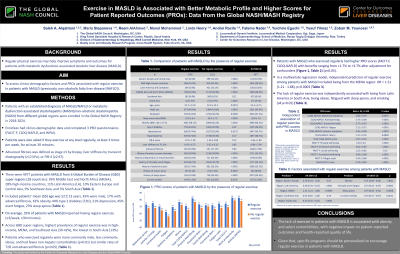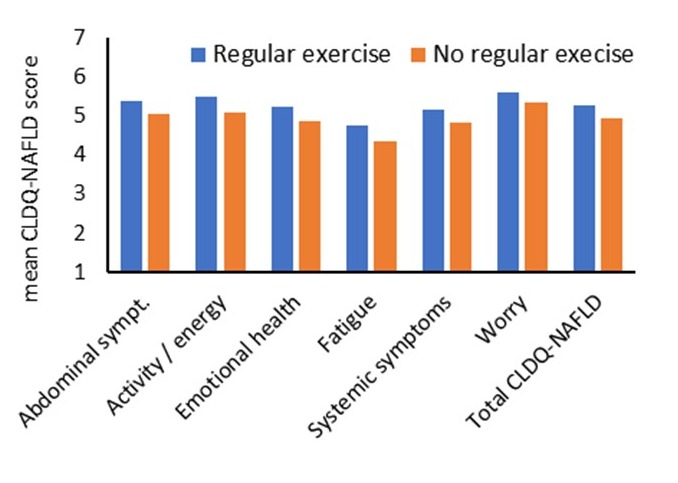Sunday Poster Session
Category: Liver
P1238 - Exercise in Metabolic Dysfunction-Associated Steatotic Liver Disease (MASLD) is Associated With Better Metabolic Profile and Higher Scores for Patient Reported Outcomes (PROs): Data From the Global NASH/MASH Registry
Sunday, October 27, 2024
3:30 PM - 7:00 PM ET
Location: Exhibit Hall E

Has Audio
- SA
Saleh A. Alqahtani, MD
Liver Transplant Unit, King Faisal Specialist Hospital and Research Centre
Riyadh, Ar Riyad, Saudi Arabia
Presenting Author(s)
Saleh A. Alqahtani, MD1, Maria M. Stepanova, PhD2, Reem AlAhamed, MD1, Linda Henry, PhD2, Andrei Racila, MS2, Fatema Nader, MBA2, Yuichiro Eguchi, MD3, Yusuf Yilmaz, MD4, Manal Mohammed, MD1, Zobair Younossi, MD, MPH, FACG2
1Liver Transplant Unit, King Faisal Specialist Hospital and Research Centre, Riyadh, Ar Riyad, Saudi Arabia; 2The Global NASH Council, Washington, DC; 3Locomedical General Institute, Ogi, Saga, Japan; 4Recept Tayyip Erdogan University, Rize, Rize, Turkey
Introduction: Regular physical exercise may be beneficial in MASLD. We assessed clinico-demographic factors and PROs associated with regular exercise in MASLD.
Methods: MASLD patients from different global regions were enrolled in GNR™. Enrollees had clinico-demographic data and completed 3 PRO questionnaires (FACIT-F, CLDQ-NAFLD, and WPAI). Subjects were also asked if they exercise at any level regularly at least 3 times per week for at least 30 minutes. Advanced fibrosis was defined as stage>3 by biopsy, transient elastography or FIB-4. Independent association of clinico-demographic factors and PROs with exercise was assessed by multivariate regression models.
Results: 4977 MASLD patients from 6 GBD super-regions (18 countries) were included [39% Middle East and North Africa (MENA), 28% high-income countries, 11% Latin America (LA), 10% Eastern Europe and Central Asia, 9% Southeast Asia (SEA), and 3% South Asia (SA); age 52±13 years, 45% male, 17% with advanced fibrosis, 63% obesity, 44% type 2 diabetes (T2D), 21% depression, 45% overt fatigue, 23% sleep apnea]. 35% of MASLD subjects reported regular exercise. Across GBD super-regions, highest prevalence of regular exercise was in high-income, MENA and SEA (39-42%), the lowest in SA (13%). MASLD patients who exercised regularly were more commonly male (50% vs. 43%), less commonly obese (58% vs. 66%), and had fewer non-hepatic comorbidities (depression 16% vs. 23%, fatigue 37% vs. 50%, sleep apnea 19% vs. 24%) (all p< 0.01) but similar rates of T2D and advanced fibrosis (p >0.05). MASLD patients with regular exercise reported higher PRO scores (FACIT-F, CLDQ-NAFLD) with benefits ranging from +1.7% to +3.7% after adjustment for confounders (Figure) (p< 0.05). In a multivariate model, independent predictors of regular exercise among MASLD included being from the MENA region (OR = 1.51 (1.21-1.88); while the lack of regular exercise was independently associated with being from LA (OR = 0.46 (0.34-0.63) or SA (OR = 0.27 (0.16-0.45), being obese (OR = 0.71 (0.60-0.83), fatigued (OR = 0.73 (0.62-0.87) with sleep apnea (OR = 0.75 (0.62-0.91), and smoking (OR = 0.70 (0.57-0.87) (all p< 0.01).
Discussion: Lack of exercise in MASLD is associated with obesity and select comorbidities with negative impact on PROs. Having MASLD in South Asia and Latin America is associated with lower rates of regular exercise, and being enrolled from MENA was associated with higher rates of exercise.

Disclosures:
Saleh A. Alqahtani, MD1, Maria M. Stepanova, PhD2, Reem AlAhamed, MD1, Linda Henry, PhD2, Andrei Racila, MS2, Fatema Nader, MBA2, Yuichiro Eguchi, MD3, Yusuf Yilmaz, MD4, Manal Mohammed, MD1, Zobair Younossi, MD, MPH, FACG2. P1238 - Exercise in Metabolic Dysfunction-Associated Steatotic Liver Disease (MASLD) is Associated With Better Metabolic Profile and Higher Scores for Patient Reported Outcomes (PROs): Data From the Global NASH/MASH Registry, ACG 2024 Annual Scientific Meeting Abstracts. Philadelphia, PA: American College of Gastroenterology.
1Liver Transplant Unit, King Faisal Specialist Hospital and Research Centre, Riyadh, Ar Riyad, Saudi Arabia; 2The Global NASH Council, Washington, DC; 3Locomedical General Institute, Ogi, Saga, Japan; 4Recept Tayyip Erdogan University, Rize, Rize, Turkey
Introduction: Regular physical exercise may be beneficial in MASLD. We assessed clinico-demographic factors and PROs associated with regular exercise in MASLD.
Methods: MASLD patients from different global regions were enrolled in GNR™. Enrollees had clinico-demographic data and completed 3 PRO questionnaires (FACIT-F, CLDQ-NAFLD, and WPAI). Subjects were also asked if they exercise at any level regularly at least 3 times per week for at least 30 minutes. Advanced fibrosis was defined as stage>3 by biopsy, transient elastography or FIB-4. Independent association of clinico-demographic factors and PROs with exercise was assessed by multivariate regression models.
Results: 4977 MASLD patients from 6 GBD super-regions (18 countries) were included [39% Middle East and North Africa (MENA), 28% high-income countries, 11% Latin America (LA), 10% Eastern Europe and Central Asia, 9% Southeast Asia (SEA), and 3% South Asia (SA); age 52±13 years, 45% male, 17% with advanced fibrosis, 63% obesity, 44% type 2 diabetes (T2D), 21% depression, 45% overt fatigue, 23% sleep apnea]. 35% of MASLD subjects reported regular exercise. Across GBD super-regions, highest prevalence of regular exercise was in high-income, MENA and SEA (39-42%), the lowest in SA (13%). MASLD patients who exercised regularly were more commonly male (50% vs. 43%), less commonly obese (58% vs. 66%), and had fewer non-hepatic comorbidities (depression 16% vs. 23%, fatigue 37% vs. 50%, sleep apnea 19% vs. 24%) (all p< 0.01) but similar rates of T2D and advanced fibrosis (p >0.05). MASLD patients with regular exercise reported higher PRO scores (FACIT-F, CLDQ-NAFLD) with benefits ranging from +1.7% to +3.7% after adjustment for confounders (Figure) (p< 0.05). In a multivariate model, independent predictors of regular exercise among MASLD included being from the MENA region (OR = 1.51 (1.21-1.88); while the lack of regular exercise was independently associated with being from LA (OR = 0.46 (0.34-0.63) or SA (OR = 0.27 (0.16-0.45), being obese (OR = 0.71 (0.60-0.83), fatigued (OR = 0.73 (0.62-0.87) with sleep apnea (OR = 0.75 (0.62-0.91), and smoking (OR = 0.70 (0.57-0.87) (all p< 0.01).
Discussion: Lack of exercise in MASLD is associated with obesity and select comorbidities with negative impact on PROs. Having MASLD in South Asia and Latin America is associated with lower rates of regular exercise, and being enrolled from MENA was associated with higher rates of exercise.

Figure: Figure
Disclosures:
Saleh Alqahtani indicated no relevant financial relationships.
Maria Stepanova indicated no relevant financial relationships.
Reem AlAhamed indicated no relevant financial relationships.
Linda Henry indicated no relevant financial relationships.
Andrei Racila indicated no relevant financial relationships.
Fatema Nader indicated no relevant financial relationships.
Yuichiro Eguchi indicated no relevant financial relationships.
Yusuf Yilmaz: Novo Nordisk – Advisory Committee/Board Member, Consultant. Zydus – Advisory Committee/Board Member, Consultant.
Manal Mohammed indicated no relevant financial relationships.
Zobair Younossi: Intercept, Cymabay, Boehringer Ingelheim, Ipsen, BMS, GSK, NovoNordisk, Merck and Abbott. – Grant/Research Support. Madrigal – Grant/Research Support. Siemens – Grant/Research Support.
Saleh A. Alqahtani, MD1, Maria M. Stepanova, PhD2, Reem AlAhamed, MD1, Linda Henry, PhD2, Andrei Racila, MS2, Fatema Nader, MBA2, Yuichiro Eguchi, MD3, Yusuf Yilmaz, MD4, Manal Mohammed, MD1, Zobair Younossi, MD, MPH, FACG2. P1238 - Exercise in Metabolic Dysfunction-Associated Steatotic Liver Disease (MASLD) is Associated With Better Metabolic Profile and Higher Scores for Patient Reported Outcomes (PROs): Data From the Global NASH/MASH Registry, ACG 2024 Annual Scientific Meeting Abstracts. Philadelphia, PA: American College of Gastroenterology.
